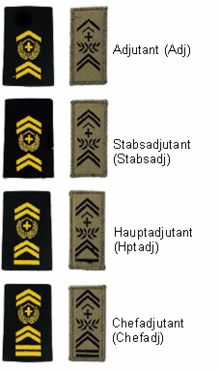adjutant

The adjutant is an officer attached to the troop commander in support . The word adjutant comes from the Latin adiuvare ' to help, support' and means something like assistant . It initially describes a military position , but also a rank .
The designation was initially used in France for the major's assistants, with major not a rank, but the service designation for the officer who was responsible for the organization (staff, food, ammunition) in the unit. From here the word found its way into the German military language.
Germany
The adjutants had the task of supporting the commander in his management duties, training and military business. Often they divided up the duties, kept diaries and reports, and had to receive and deliver reports and orders . In the German Reich , due to their function, adjutants were mounted on duty, later motorized.
Senior adjutants were called the adjutants at the higher command posts, from brigades upwards. The area of responsibility of an adjutant in a brigade, division , army corps , army or army group was personnel work, i.e. replenishment, awards, promotions and officer positions. The area of responsibility thus corresponded roughly to the activity of a G1 (A1) officer in staffs at NATO and the Bundeswehr. The outer badge of the adjutants in the German army was an adjutant sash or an adjutant's lanyard worn over the right shoulder .
Personal aides were typically only held by the princes of ruling houses. The adjutants of ruling princes were called wing adjutants (in the rank of staff officers ). Set before them who were (first) Adjutant General (in Prussia since 1758), which in general senior aides standing of the monarch .
In the Bundeswehr, adjutants are regularly assigned to a general from the position of a division commander . A division commander is usually assigned a captain ( grade A11). As the rank of the commander to be assisted rises, so does the rank of the adjutant assigned to him. Finally, the Federal President is provided with an adjutant with the rank of colonel (or sea captain ).
France
In France the rank of adjudant was introduced in the army in 1776; He described the most senior non-commissioned officer of a battalion , and later the company . The chief adjudicator and the major are in front of the adjudant today .
During the Revolutionary Wars, there was an "Adjudant-général" as head of administration on the staff of a division. It wasn't a rank, but a position. The Adjudant-général replaced the Maréchal de camp in the function of "Chef d'état-major des armées" (about: Chief of the Army Staff). It was an officer up to the rank of Commandant . He was usually addressed in the short form "Général". In 1800 the title was changed to "Adjudant-commandant". After the end of the empire this name was abolished again. One of the most famous of the "Adjudant-général" / "Adjudant-commandant" was the later Maréchal Michel Ney
As a badge of service they wore a star on the epaulette .
In the current French army, the rank of "Adjudant" corresponds to the staff sergeant.
Austria
In Austria the adjutant of the Federal President is a high-ranking officer and companion of the Federal President , the Commander in Chief of the Federal Army .
- For Austria-Hungary see kuk adjutants .
USA and UK
In Great Britain and the United States , the Adjutant General is the highest staff officer in an army and only subordinate to the chief of staff . He is responsible for organizational issues and the military training of officers and men.
In Great Britain, adjutants are higher-ranking commissioned officers i. d. Usually in the rank of captain , who have control and support tasks (as opposed to the strategic tasks of the commanding officer, usually a major ).
In the individual states of the USA, the commanders of the National Guard are also referred to as adjutant general.
In the British Navy the adjutant was the signal officer .
Switzerland
In the Swiss Armed Forces, an adjutant is either the function of a commanding assistant in a staff responsible for personnel, or a rank of the higher non-commissioned officers:
Adjutant Unteroffizier (Adj Uof, adjudant sous-officier, aiutante sottufficiale)
The Adj Uof can either be a career sergeant or, in a militia role, a logistics sergeant, chief mechanic or accident train driver. As a professional sergeant, an instructor in a specific subject area. (e.g. Head of Sport, ...) On assignments abroad, he is referred to as Warrant Officer (WO).
Staff adjutant (staff adjutant, adjudant d'état-major, aiutante di stato maggiore)
New degree since January 1, 1996. As a professional sergeant, normally the standard professional sergeant or class teacher at the sergeant school as well as the higher sergeant course. In the militia deployment in the staff of a battalion responsible for non-commissioned officers and at the same time ensign. On assignments abroad, he is referred to as a Staff Warrant Officer (bn) (SWO).
Chief adjutant (Hptadj, adjudant-major, aiutante maggiore)
New degree since January 1, 2004. Assistant command of a school or brigade commandant. When deployed abroad, he is referred to as a Master Warrant Officer (bde) (MWO).
Chief adjutant (chiefadj, adjudant-chef, aiutante capo)
New degree since January 1, 2004. Assistant command of a commander of a territorial region, Kdt Heer, Kdt Luftwaffe or CdA. On assignments abroad, he is referred to as Chief Warrant Officer (div) (CWO).
See also
literature
- Michael Schoene, Military manual for quick orientation in all war incidents and the objects coming into contact with such , p.1 Adjutantdienst
- Carl Urban, the adjutant. A Practical Guide to the Service , 1838, digitized
- Allmayer-Beck , Lessing : The K. (below) K. Army. 1848-1914 . Bertelsmann, Munich et al. 1974, ISBN 3-570-07287-8 .
